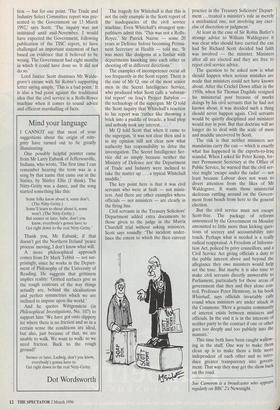Mind your language
I CANNOT say that most of your suggestions about the origin of nitty- gritty have turned out to be greatly illuminating.
One possibly helpful pointer came from Mr Larry Eubank of Jeffersonville, Indiana, who wrote, 'The first time I can remember hearing the term was in a song by that name that came out in the Sixties, by Shirley Ellis (I think). The Nitty-Gritty was a dance, and the song started something like this:
Some folks know about it, some don't. (The Nitty-Gritty.) Some'll learn to shout about it, some won't. (The Nitty-Gritty.) But sooner or later, babe, don't you know, everybody's gonna have to Get right down to the real Nitty-Gritty.'
Thank you, Mr Eubank; if that doesn't get the Northern Ireland 'peace process' moving, I don't know what will.
A more philosophical approach comes from Dr Mark Tebbit — not sur- prisingly, since he works in the Depart- ment of Philosophy of the University of Reading. He suggests that grittiness implies reality: 'Gritted surfaces give us the rough contours of the way things actually are, behind the idealisations and perfect symmetries which we are inclined to impose upon the world.'
And he quotes Wittgenstein (in Philosophical Investigations, No. 107) to support him: 'We have got onto slippery ice where there is no friction and so in a certain sense the conditions are ideal, but also, just because of that, we are unable to walk. We want to walk: so we need friction. Back to the rough ground!'
Sooner or later, Ludwig, don't you know, everybody's gonna have to Get right down to the real Nitty-Gritty.
Dot Wordsworth


































































 Previous page
Previous page